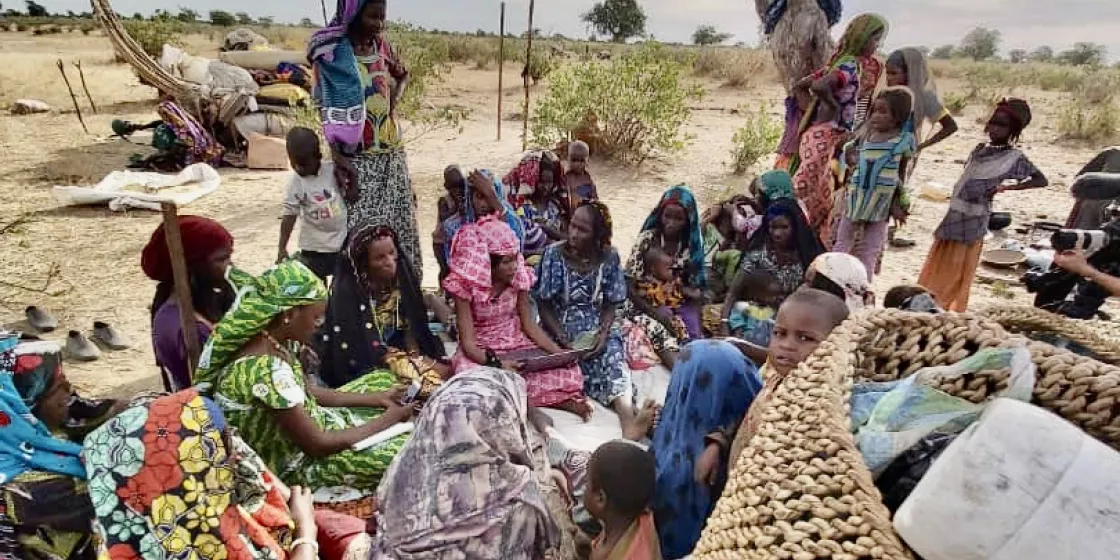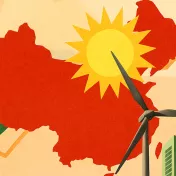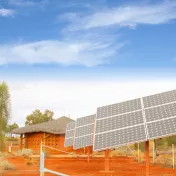The poorest populations in the Global South are fighting against the yet unforeseeable consequences of the coronavirus and the impacts of climate change simultaneously.
They urgently need support in building resilience to the health and climate crises and in dealing with unavoidable climate impacts.
Poverty increases vulnerability
Lack of food and clean water, lack of access to health care, no reserves for emergencies – poverty makes people vulnerable – both against the impacts of climate change and the current health crisis caused by the coronavirus. Both factors can easily become an existential threat for particularly vulnerable people in countries of the Global South. It is pointless to compare the two crises. Moreover, the instruments for containment can only be compared on an abstract level: good education, a reliable health system, access to information and good governance would help for example. The interplay of the two crises is currently emulsifying in various regions of the Global South into a toxic cocktail for the affected populations. This shows how brutally one crisis reinforces the other. They hit the poorest and most vulnerable hardest, acting as poverty multipliers and forcing families into extreme poverty.
Even if ongoing climate change affects everyone and the coronavirus might also infect everyone worldwide, people in poverty are much more vulnerable to both crises. They simply lack the means to prepare themselves adequately and protect themselves from the consequences.
The poorest populations in the Global South are already affected by the climate crisis to a much greater extent than in the Global North: on the one hand, because of their unfavourable geographical location and, on the other hand, because of their socio-economic situation and the resulting lack of ability to protect themselves against the effects of climate change. The Germanwatch Climate Risk Index clearly shows: 70 % of the ten countries most affected by extreme weather events between 1999 and 2018 are among the least developed countries.
Climate change impacts make it more difficult to deal with the corona crisis
In the Sahel zone, the impacts of climate change are evident and many communities already have to adapt to its consequences.
More intense droughts and floods, which last year were particularly severe in Niger and Chad, are a serious reason leading to more than five million people throughout the region suffering from severe hunger. The United Nations World Food Programme is already sounding the alarm because the number of starving people in the Sahel is rising – while the coronavirus is now spreading there too – to the countries with the weakest health systems worldwide. Hunger weakens the immune systems of the poorest populations, and the necessary measures to contain the corona crisis are hardly feasible for them: clean water, adequate sanitation or even hand cleansers are not available and "physical distancing" is almost impossible in many settlements and slums. A shutdown is an existential threat for many day labourers who depend on their wage for their daily meals. In addition, the support migrants are providing for their families through remittances (money transfers to home countries) is currently difficult or even impossible because many banks are closed and relatives in the industrial countries have lost their jobs due to the corona crisis.
Hindou Ibrahim, coordinator of a women's organization in Chad that belongs to the Indigenous Network Africa (IPACC), a partner organization of Bread for the World, has been supporting indigenous communities fighting the effects of climate change for years. Although climate change is not the sole cause, it is an important driving force behind the hostile developments in Chad: lakes threatened to dry up, steadily growing desertification, temperatures of up to 50°C and persistent droughts are leading to massive water shortages. "If hand washing with soap is our only effective protection against the virus, how can we protect ourselves without having access to water and soap? These questions are desperately asked by people from the poorest sections of the population whom I try to support. They are in panic fear of infection because their immune systems are weakened anyway and they have little access to medical care. They cannot risk an infection," says Hindou Ibrahim. In addition, the protective measures enacted by the government have massive effects. A curfew has also been imposed in Chad to curb the spread of the virus.
"People live from hand to mouth, they have to sell their harvests at the markets and/or are dependent on buying their own food there. A curfew will increase hunger. Moreover, it is almost impossible to lock up people who depend on community life," Ibrahim said.
Partner organizations such as the Centre for Science and Environment (CSE) in India point to a similar desperate situation. Heavy rain and hail destroyed the cultivation of the Rabi culture (winter sowing and harvesting), mustard and wheat in March in the entire state of Haryana. The small farmers have applied to the Revenue and Disaster Management Department of the State of India for compensation for the loss of the seeds. The district government was just beginning to request compensation when the government imposed a three-week curfew on the entire state. As a result, both the damage surveys and the urgently needed compensation payments have been put on hold.
The consequences of climate change also fuel the spread of the coronavirus in already difficult situations. Bangladesh is one of the countries already severely affected by climate change. The poorest people there hardly manage to adapt to the changed conditions. Floods, superstorms and soil salinization make survival based on agricultural yields increasingly difficult. Adaptation measures have often already reached their limits, resulting in climate-change-related loss and damage that people cannot cope with. As a result, many give up their lives in the countryside and migrate to the slums of the major cities in search of better living conditions and work. Md Shamsuddoha, Director of the Center for Participatory Research and Development in Bangladesh, has been fighting for years in partnership with Bread for the World and Germanwatch at the UN climate negotiations for the rights of people who are affected by climate-related loss and damage and who are displaced by climate change impacts. He demands industrialized countries to accept their responsibility and financially support the poorest population groups in dealing with climate-related loss and damage. If the poorest people are enabled to adapt to climate change and receive immediate financial support in the event of a disaster, they often do not become displaced and are not forced to leave their homes and migrate.
"While the slums in the major cities are overflowing, even of people who have given up the fight against climate change, a slum is a perfect breeding ground for the spread of the coronavirus. People are crowding into the tightest of spaces, it is not possible to keep a physical distance, the sanitary situation is a disaster. Despite the imposed curfew, it is impossible to implement the prescribed precaution measures in the slums," says Md Shamsuddoha.
At the same time as this blog is being written, the small Pacific island states of Vanuatu, Solomon Islands and Fiji are fighting against the enormous destructive force of Category 5 superstorm TC Harold, while also taking measures against the spread of the coronavirus. Here, two crises threaten to reinforce each other: Vanuatu has already suffered loss and damage due to climate change impacts in large parts of the country. To contain the coronavirus, the country has declared a national emergency and imposed a curfew. However, these had to be lifted now so that the islanders had to find shelter in storm-proof emergency shelters. The question of whether humanitarian aid workers can come into the country must also be weighed against the protective measures against corona and for protection against the superstorm. James Bhagwan, Secretary General of the Pacific Council of Churches, is highly concerned for his people:
"At the same time we are mindful with Tropical Cyclone Harold passing Solomons enroute to Vanuatu that COVID19 will also impact Disaster Risk Reduction – for example physical distancing in evacuation centres. Due to climate change, we in the Pacific do not only experience more frequent and extreme weather patterns, we are also experiencing a longer period in terms of an extended cyclone season, possibly as far as the end of next month. Dealing with both crises exposes us to higher risks overall."
The aggravation of the economic damage and the consequential effect
More frequent extreme weather and slow onset processes are increasingly preventing sustainable development in small island states and in the least developed countries. The limate-related loss and damage they have to cope with cause poverty, higher debt and lower adaptive capacity. There is also the risk of stranded assets, for example as a result of future extreme weather events. Because of the high climate risks, the countries particularly affected by climate change must also pay higher interest rates for loans from abroad than risk premiums. Worse still, the damage costs in these countries will continue to rise – partly because the industrialized and emerging countries have not yet reduced their emissions, as envisaged in the Paris Climate Agreement. On the other hand, the rich countries are not fulfilling their responsibility to provide adequate climate financing for protection against the climate crisis. Adaptation finance is seriously underfunded. There is a lack of both adequate funds and even an obligation on the rich and high-emitting countries to provide financial support to affected populations in countries of the Global South to cope with the loss and damage caused by climate change.
Meanwhile, people in the poorest and most vulnerable countries and their governments are largely bearing the costs of coping with the climate crisis themselves materializing in high levels of climate damage, poorer access to capital markets and a drop or slower growth in gross domestic product. Climate Analytics estimates that, in addition to the direct climate damages already being suffered by small island states and least developed countries, they must expect additional economic losses of up to 10 % of GDP by 2030. And even up to 50 % losses of GDP by 2050 if, as is currently expected, global warming of 3°C occurs, thus far exceeding the 1.5°C limit targeted by risk provisions.
The order of the moment: building resilience, climate financing and debt relief
The climate crisis and the exponentially growing corona crisis are intensifying massively, especially in countries of the Global South, and pose an existential threat to poor and vulnerable people. First priority is to reduce the vulnerability of those people who are particularly affected, to build up their resilience to climate impacts and to support them especially in dealing with unavoidable consequences.
The example of India shows that resilience to climate impacts and the ability to respond to other crises, such as the current corona crisis, are interdependent. States such as Kerala, which have been particularly successful in achieving sustainable development goals and conduct climate risk management, including climate adaptation, are particularly effective in dealing with the corona crisis. [1]
National states are called upon to implement such preventive measures to protect fundamental human rights - but they are entitled to appropriate international climate financing. In addition to the industrialized countries' pledge to provide USD 100 billion annually for mitigation and adaptation from 2020 onwards, industrialized countries and other wealthy and high-emitting states should commit themselves to establish a sufficiently funded mechanism for coping with climate-related damages from 2025 at the latest. The corona crisis may open up a window of opportunity for establishing a mechanism for both health and climate risks. Even though the next climate summit COP26 in Glasgow has been postponed to 2021, further paths for additional funding for the poorest and most vulnerable states to tackle the climate crisis must be defined here.
As it is precisely these states that are becoming increasingly indebted, partly as a result of the climate crisis, a debt moratorium or debt relief in the wake of an extreme weather event was proposed, even before the corona crisis. The need for such a moratorium or debt relief is further increased by the corona crisis – especially in poor countries that are hardly in a position to cope with the climate damages. In order to avert further humanitarian disasters, the multilateral financial institutions IMF and World Bank are also sounding the alarm: in a joint declaration, they have called on creditor governments for debt relief for the poorest countries to cope with the corona pandemic. A waiver of the debt service payments now due would quickly free up funds available locally to combat the virus and its consequences. Although the two institutions themselves are among the creditors, they are demanding this measure – but first of all from governments, such as Germany. The alliance Erlassjahr.de also demands that Germany grant debt relief, and the IMF and World Bank themselves should also be prepared to waive debt repayments. This would make their appeal to bilateral creditors more credible.
International solidarity and responsibility
Those responsible for the climate crisis are clearly defined: in accordance with the polluter-pays principle, the industrialized countries are obliged to support in coping with the impacts of climate change. But also high-emitting emerging economies with levels of wealth sufficient enough to support people in the poorest countries – who have not contributed to the climate crisis but are already suffering from it – must make their contribution. In the case of the coronavirus, the following applies: Even if environmental destruction, lack of species protection and other reasons have contributed to the spread of the virus, no one can be identified as the sole culprit and thus no responsibility can be clearly "attributed". This is where solidarity worldwide is called upon the international community to stand together and provide jointly coordinated humanitarian and socio-economic aid to each other. At the moment of the acute global emergency situation, all measures to contain the coronavirus and the emergency response after an extreme weather event must be carefully dovetailed with both crises.
Outlook
What is at stake is nothing less than a global Marshall Plan after the corona crisis, which will significantly increase the resilience of poor countries and build climate-compatible infrastructure.
The provision of climate finance by industrialized countries and, increasingly, other wealthy states, and debt relief for the poorest states are now important instruments for adhering to the sustainable development goals and the Paris climate goals. The green economic stimulus packages to tackle the corona crisis must also be geared to these goals.
[1] SDG India: Index & Dashboard
This blog was created in cooperation between Bread for the World and Germanwatch.







